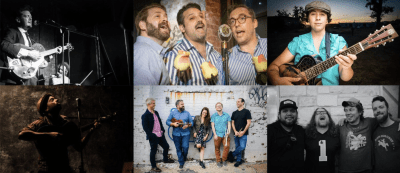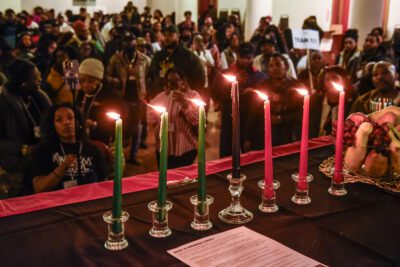Photo illustration by Joelle McKenna
Why this Brooklyn tech investor is excited about post-pandemic New York
On the podcast, Brooklyn Bridge Ventures founder Charlie O'Donnell discusses how the pandemic is shaping the future of New York City business
Like what you’re hearing? Subscribe to us at iTunes, check us out on Spotify and hear us on Google, Amazon, Stitcher and TuneIn. This is our RSS feed. Tell a friend!
Charlie O’Donnell is among the more interesting investors in New York City if not the most influential investor in Brooklyn tech—yes that’s a thing. As the sole partner and founder at Brooklyn Bridge Ventures, O’Donnell and his firm make seed and pre-seed investments in New York companies that have yet to raise $750,000 in previous rounds—combined, they manage approximately $30 million and counting across three funds. Think of it as “Shark Tank,” but with less drama.
As such, O’Donnell has a front row seat to what’s coming down the pike. Among the more surprising insights he shares after a year of lockdown? “It’s an exciting time to be in New York City,” he says.
O’Donnell, a Bensonhurst native son, is the latest guest on “Brooklyn Magazine: The Podcast.” Brooklyn Bridge Ventures claims to be the first venture firm based in Brooklyn. The fund has invested in the first rounds of Ample Hills Creamery, Clubhouse, The Wing, Canary, Hungryroot, Imagen, and goTenna among others.
In our wide-ranging conversation, we discuss how the pandemic has—or has not—influenced the startup scene in New York and what he sees popping up more often these days. O’Donnell breaks down how he spends his time, how to pitch him, how not to pitch him, bias in the fundraising process, growing up on Bensonhurst, cycling in the city and more.
A few highlights below.
Optimism around New York
“I know a fair amount of people who have recently move to New York to start a business. It’s interesting because all throughout the pandemic you heard ‘New York is Dead,’ and ‘everyone’s moving away,’ and ‘who’s going to Miami?’ I’m actually seeing some the most amount of excitement about being in and around New York that I’ve seen in my career.”
On growing up in Bensonhurst in the 1980s-’90s
“We never left Bensonhurst or Bay Ridge for anything. I didn’t even know Williamsburg even existed as a place. I commuted into the city for high school … I had never been to the Empire State Building. It was just a building. We lived in our own outer borough spot.”
On the types of pitches he’s hearing more of these days
“The pandemic was so disruptive to every facet of our lives. As we sort of think about coming back out, there’s a renewed sense of, ‘How do we remake these sectors?’ Quote-unquote ‘Build back better?’ It’s not just going back to the way things were. There were some fundamentally broken aspects of these industries that people would like to see changed. Certainly health care is probably number one on that list.”
“Any company that is involved in helping people move around more easily in New York is creating a lot of benefit … Everything in New York is pretty close to each other except for actual time. I am fan of anybody who is building tech that makes it easier for somebody to live in the further reaches of the city and make it easy to get around. For example I’m a big fan of Revel.”
On his investing ethos
“One of the things that’s important to me about the fund is accessibility. It’s the idea that this is not some ivory tower connection fund. This is not the inner circle of Silicon Valley. I got my email address right on the website—it’s charlie@brooklynbridge.vc. I’m open to hearing people’s good ideas … The result of that is a fairly diverse group of founders. About 40 percent of the founding teams that I’ve backed have a female founder or co-founder.”
Mistakes founders frequently make in pitching him
“A lot of founders, in a really well-intentioned way, focus too much on the past: ‘We signed our first customer; we’ve gotten to break-even; we’ve grown month over month. We’ve accomplished all of this stuff.’ They think about fundraising as a reward for accomplishments, when in reality you’re actually selling tickets to the future … It’s great that three people are willing to pay for something , but I want to know ho you get to 100 or 1,000 or 10,000.”
Hear more on the podcast, wherever you get your podcasts.
You might also like 


























